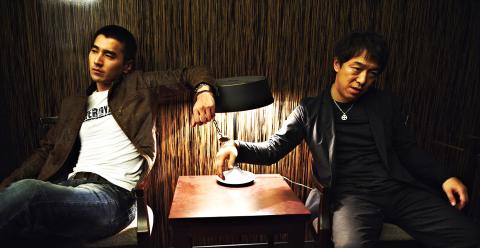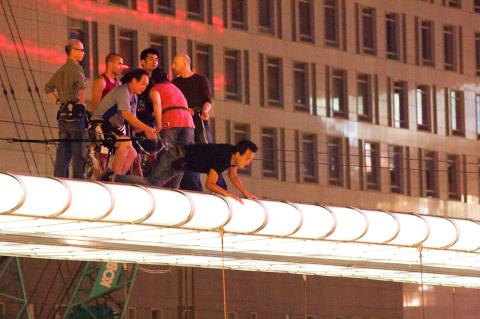A helicopter shootout, street explosions and a hijacked airplane — these are common elements in Hollywood action flicks, but they are rarely, if ever, attempted by Taiwanese cinema. That is, until now. An action blockbuster released for the Lunar New Year, Black and White Episode 1: The Dawn of Assault (痞子英雄首部曲:全面開戰) by Tsai Yueh-hsun (蔡岳勳) successfully turns up the heat with action sequences the like of which have never been seen in local productions. The fireworks are complemented by a star-studded cast led by Mark Chao (趙又廷) and China’s Huang Bo (黃渤).
There is already talk of a sequel as the current movie is billed as the prequel to Tsai’s popular TV drama Black and White (痞子英雄).
Set in a fictional metropolis named Harbor City, the movie begins with an illegal diamond deal gone wrong as small-time gangster Xu Dafu, played by Huang, finds there is more than one buyer salivating over his smuggled gems. A group of military men intercept the case of diamonds, killing everyone on the spot but Xu. He is rescued by Hero Wu, played by Chao, a young, upright police officer who believes there is no gray area in justice.

Photo courtesy of Universe Entertainment
It does not take long before the two are targeted and chased by rival hit men and militants.
The story unfolds when beautiful scientist Fan Ning (Angelababy, aka Yang Ying, 楊穎) comes along, explaining that the whole hullabaloo is not about the diamonds, but what else the case contains: an anti-matter bomb that could destroy humanity if it falls into the wrong hands.
The villains, in this case, are a militant group from Pawanda, a make-believe country in Southeast Asia, which is planning to set off the bomb in the city.

PhotoS courtesy of Universe Entertainment
Naturally, fingers are crossed that the unlikely duo will save the day.
Mostly shot in Kaohsiung with a hefty budget of NT$350 million, the movie is an ambitious project produced by a skilled crew of filmmakers.
The action choreography was created by French martial artist and actor Cyril Raffaelli, who works closely with Luc Besson, while a professional pyrotechnics studio from Hong Kong supervised the explosion scenes.

PhotoS courtesy of Universe Entertainment
Director Tsai and his team spent NT$30 million to have an aircraft mock-up made in the US. Now based in Kaoshiung, the plane is Taiwan’s first to be built specially for movies.
Needless to say, the resulting movie is packed with adrenaline-pumping action, all undertaken without stuntmen.
Chao is definitely an action star in the making. He jumps from a bridge, spins a car at high speed and drives through explosions.
There is a sparkling on-screen chemistry between Chao and Huang as the righteous cop and the smart-mouthed gangster. The two partners progress through finely choreographed set pieces that make good use of the diverse landscapes that the port city offers. From industrial docks, ultra modern skyscrapers to a bustling urban center, Kaohsiung looks like an amusement park for filmmakers, which will probably please the movie’s sponsor, the city’s government.
Though the action is top-notch, more often than not, the film prizes style over content.
The story and the motives of the characters are not properly outlined, and plot lines appear and disappear without sufficient exposition. As a result, the film gets a bit baffling toward the end as to what groups of characters are involved.
Nevertheless, director Tsai and his team deserve a round of applause for producing a slick Hollywood-style production.
Apart from Black and White Episode 1: The Dawn of Assault, the Lunar New Year season sees a slew of Taiwanese movies hitting the big screen to entertain the holiday crowds. Both Flying Dragon, Dancing Phoenix (龍飛鳳舞) [see Around Town, page 13] and Din Tao: Leader of the Parade (陣頭) focus on local culture in the form of gezai opera and temple fairs, respectively. Meanwhile, Bang Bang Formosa (寶島大爆走) and Perfect Two (新天生一對) by slapstick director Chu Yen-ping (朱延平) target people with a taste for farcical comedy. Finally, romance blossoms in The Soul of Bread (愛的麵包魂), starring rising star Michelle Chen (陳妍希), and Doze Niu’s (鈕承澤) star-studded Love (愛), will be released on Feb. 10.

The canonical shot of an East Asian city is a night skyline studded with towering apartment and office buildings, bright with neon and plastic signage, a landscape of energy and modernity. Another classic image is the same city seen from above, in which identical apartment towers march across the city, spilling out over nearby geography, like stylized soldiers colonizing new territory in a board game. Densely populated dynamic conurbations of money, technological innovation and convenience, it is hard to see the cities of East Asia as what they truly are: necropolises. Why is this? The East Asian development model, with

June 16 to June 22 The following flyer appeared on the streets of Hsinchu on June 12, 1895: “Taipei has already fallen to the Japanese barbarians, who have brought great misery to our land and people. We heard that the Japanese occupiers will tax our gardens, our houses, our bodies, and even our chickens, dogs, cows and pigs. They wear their hair wild, carve their teeth, tattoo their foreheads, wear strange clothes and speak a strange language. How can we be ruled by such people?” Posted by civilian militia leader Wu Tang-hsing (吳湯興), it was a call to arms to retake

This is a deeply unsettling period in Taiwan. Uncertainties are everywhere while everyone waits for a small army of other shoes to drop on nearly every front. During challenging times, interesting political changes can happen, yet all three major political parties are beset with scandals, strife and self-inflicted wounds. As the ruling party, the Democratic Progressive Party (DPP) is held accountable for not only the challenges to the party, but also the nation. Taiwan is geopolitically and economically under threat. Domestically, the administration is under siege by the opposition-controlled legislature and growing discontent with what opponents characterize as arrogant, autocratic

When Lisa, 20, laces into her ultra-high heels for her shift at a strip club in Ukraine’s Kharkiv, she knows that aside from dancing, she will have to comfort traumatized soldiers. Since Russia’s 2022 invasion, exhausted troops are the main clientele of the Flash Dancers club in the center of the northeastern city, just 20 kilometers from Russian forces. For some customers, it provides an “escape” from the war, said Valerya Zavatska — a 25-year-old law graduate who runs the club with her mother, an ex-dancer. But many are not there just for the show. They “want to talk about what hurts,” she